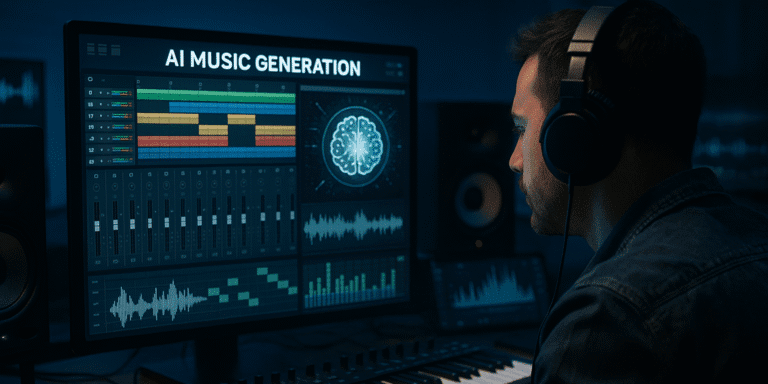Artificial Intelligence (AI) has already transformed numerous industries, and now it’s infiltrating the world of music production. From AI-generated melodies to virtual instruments, AI’s influence on pop music has the potential to shift the very foundation of how music is created. But does this technological advancement signal a future of enhanced creativity, or will it strip the soul from music?
AI’s Role in Music Production: A New Era
Artificial Intelligence (AI) is reshaping the way music is produced, with tools capable of generating original compositions, writing lyrics, and even mimicking popular artist styles. AI-powered platforms like OpenAI’s MuseNet and Google’s Magenta can analyze massive datasets of music, learning how to replicate chord progressions, rhythms, and emotional tones. With this technology, AI can now produce original songs in various genres, including pop.
The potential for AI in music creation is vast. Artists no longer need full bands or orchestras to produce music—AI tools like Aiva and Amper Music allow users to generate melodies, harmonies, and rhythms with just a few clicks. For producers, AI has also streamlined the mixing and mastering process. Algorithms like LANDR refine tracks automatically, saving time and money.
However, the rise of AI in music has raised concerns about the authenticity of these creations. Could AI replace human musicians, or is it simply another tool to enhance creativity?
AI: The Double-Edged Sword
AI-driven tools offer immense possibilities for musicians and producers, but they come with ethical challenges. One key concern is whether AI can truly replicate the emotional depth and personal touch of human-created music. Human musicians often draw from their life experiences and emotions, something AI currently cannot replicate on a meaningful level. While AI can generate tracks that sound impressive, some fear that it may lack the storytelling and soul present in human-made music.
The music industry’s structure may also face a transformation as AI-generated tracks gain popularity. The fear is that the rise of AI could undermine human musicians’ livelihoods, making it harder for traditional artists to stand out in an industry flooded with machine-made songs. This could lead to job losses for composers, producers, and performers who depend on their craft for a living.
Another concern is that AI might eventually replace some of the human roles involved in music production. While these tools can aid the creative process, some worry that automation could gradually diminish the need for skilled professionals, leading to a shift in the traditional model of music creation.
Striking a Balance: Enhancing, Not Replacing, Creativity
Despite concerns, many experts believe that AI is a tool, not a replacement for human creativity. Industry professionals like music producer Timbaland have embraced AI as a way to push the boundaries of their work. “AI can help spark ideas that you may not have thought of,” he says, “It’s a tool that helps you expand your creative process, not replace it.”
Many technologists view AI as a way to enhance human artistry rather than overshadow it. Dr. Yishai Simhon, a music technology expert, believes AI opens new creative frontiers for musicians. “It’s about using machines to help human artists push the boundaries of sound,” he explains. While AI can’t replace the human experience, it can provide new ways to explore and experiment with music that might not otherwise be possible.
The Changing Landscape of Music Creation
The impact of AI on music production isn’t just about the technology—it’s about changing the business of music as well. With AI tools becoming more accessible, artists of all levels can create and produce music independently, bypassing traditional production methods. This democratization of music creation could level the playing field for aspiring artists, allowing them to bypass industry gatekeepers and reach audiences directly.
However, this could also lead to a saturation of the market, making it harder for individual artists to stand out. With AI tools making music creation easier than ever, the competition will be fierce. Artists may need to adapt their branding and creative approaches to maintain a unique identity in an increasingly crowded digital space.
The Future of Music: Will AI Enhance or Replace Human Artistry?
At the heart of the debate is the question: Can AI truly replicate the uniqueness of human artistry in music? While AI tools can mimic styles, they can’t capture the human experience that forms the foundation of much of our favorite music. Music producer Rick Rubin argues that art is about connecting with people on an emotional level. “Machines can’t feel emotions; they can only mimic patterns,” he says.
But others believe that AI could usher in a new creative renaissance. Rather than replacing musicians, AI could offer new opportunities for experimentation and innovation. With AI as a collaborator, artists could experiment with new genres and sounds, merging the organic with the artificial in ways never before imagined.
The Final Chord: What’s Next for Music?
AI’s role in music production is still evolving, but its potential to reshape the industry is undeniable. It offers groundbreaking opportunities for artists and producers, streamlining the production process and making it easier for creators to develop and distribute their work. However, as AI-generated music becomes more mainstream, questions about the authenticity, creativity, and future of human musicians will continue to grow.
The future of AI in music will ultimately come down to how artists, producers, and the industry as a whole balance the benefits of technology with the need for human creativity. While AI may never replace the soul of music, it may just transform the way we create it.


